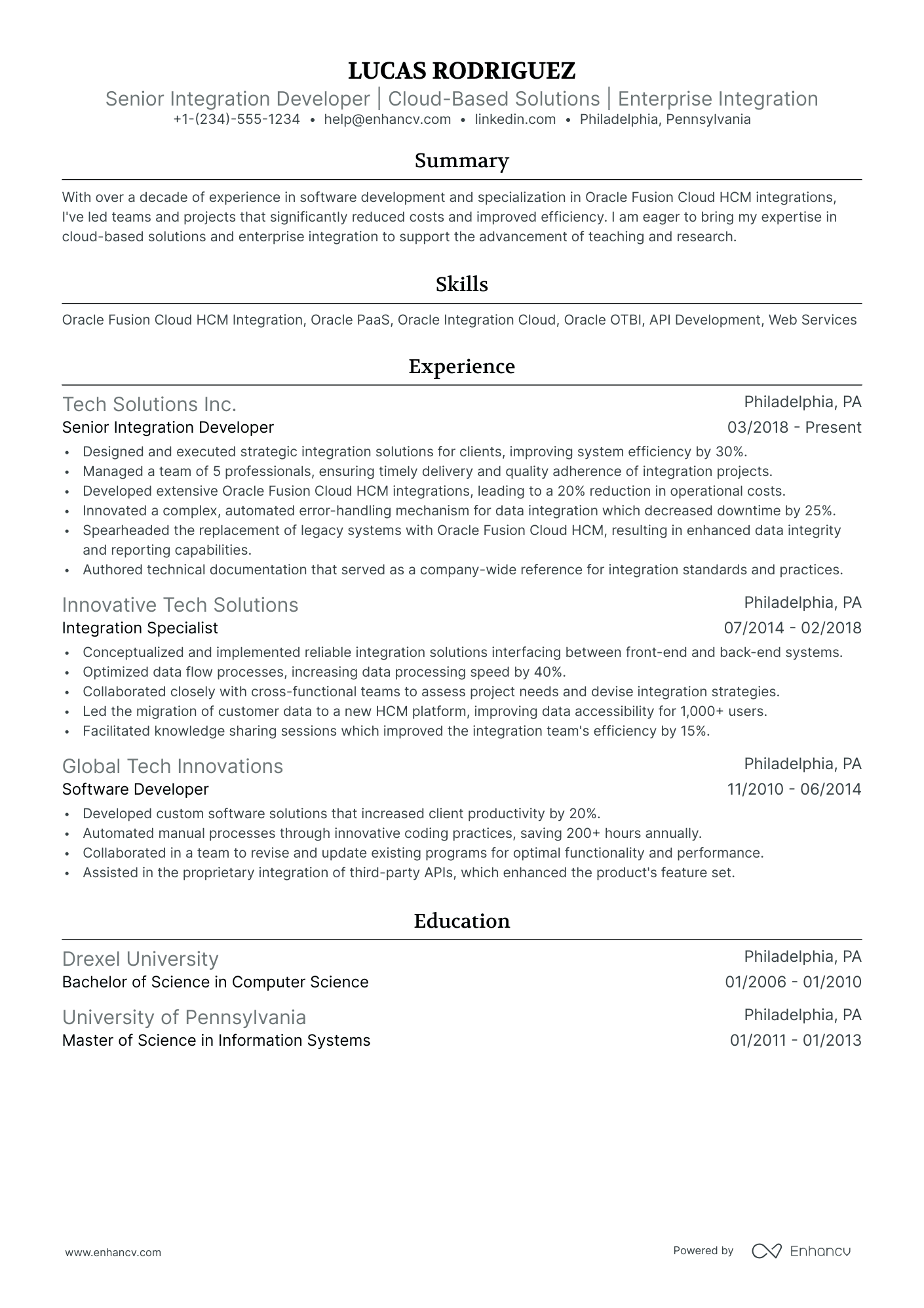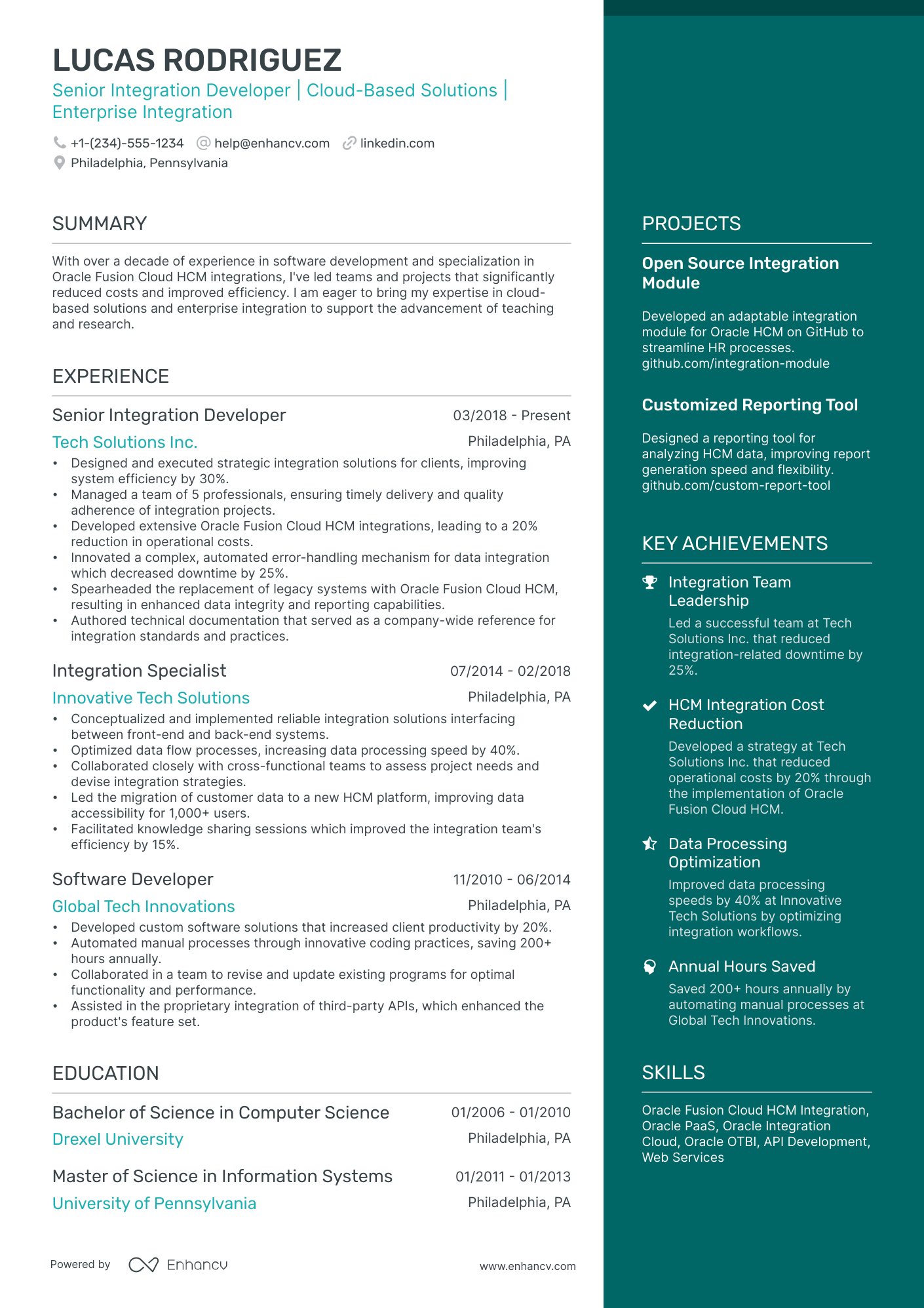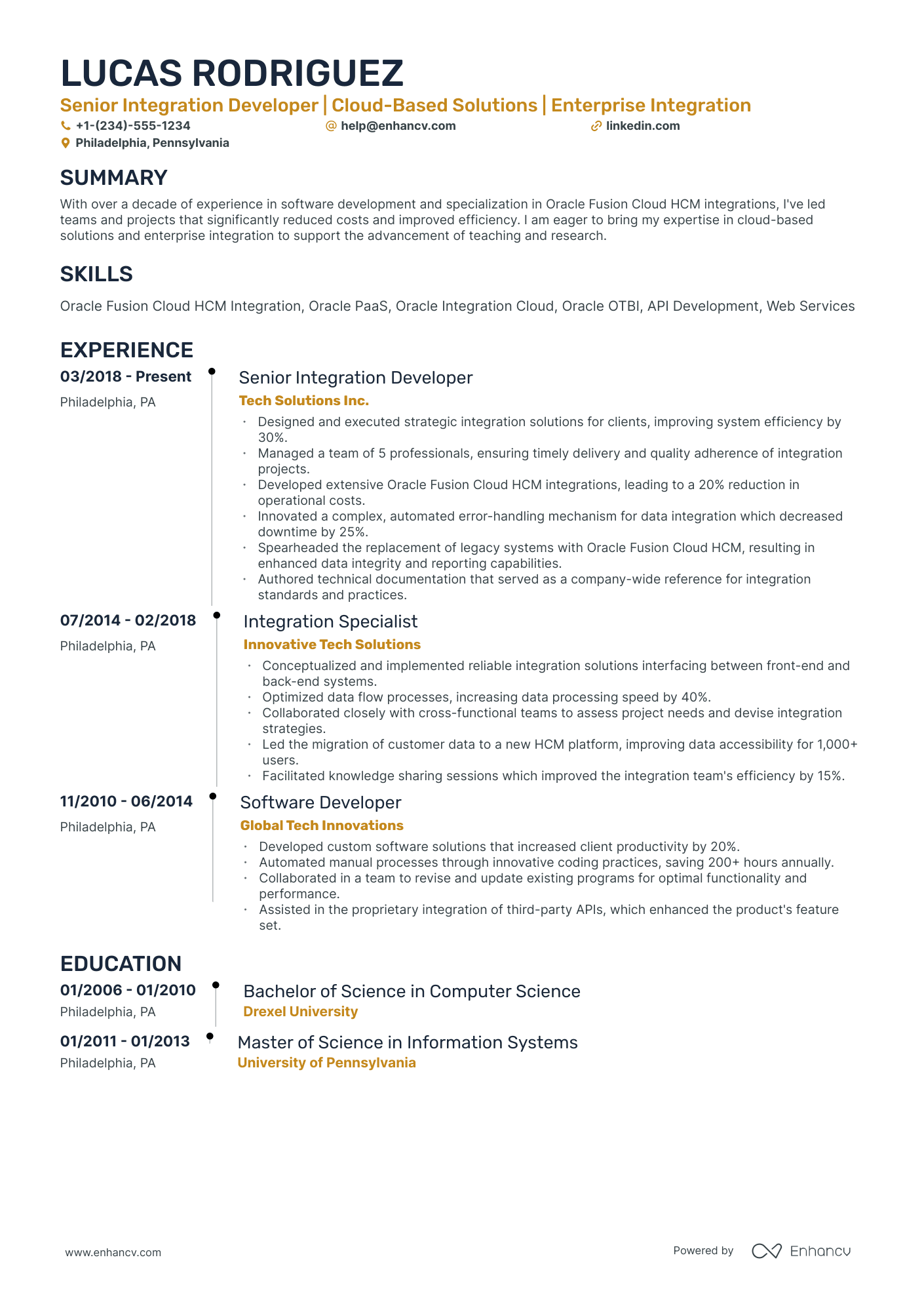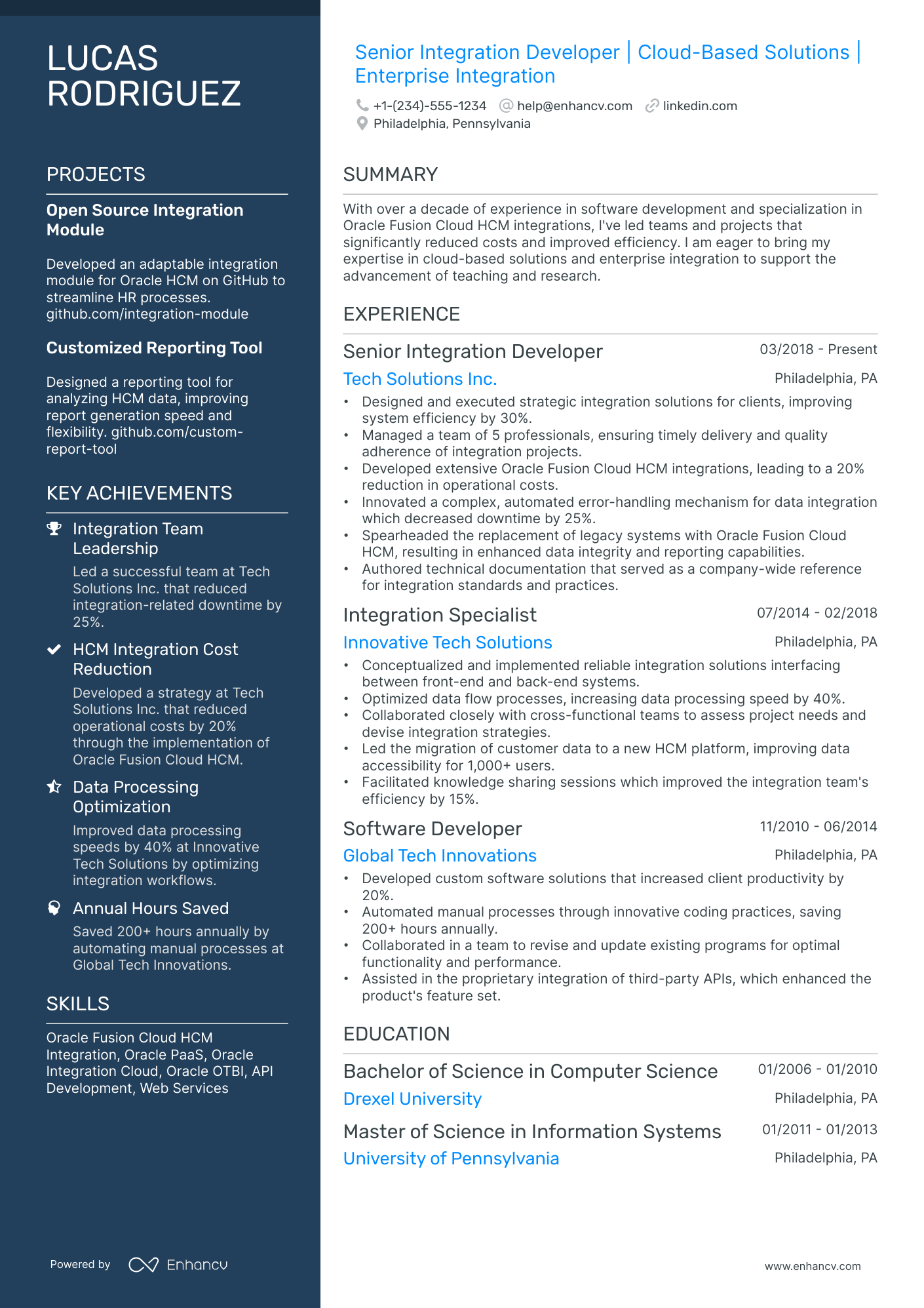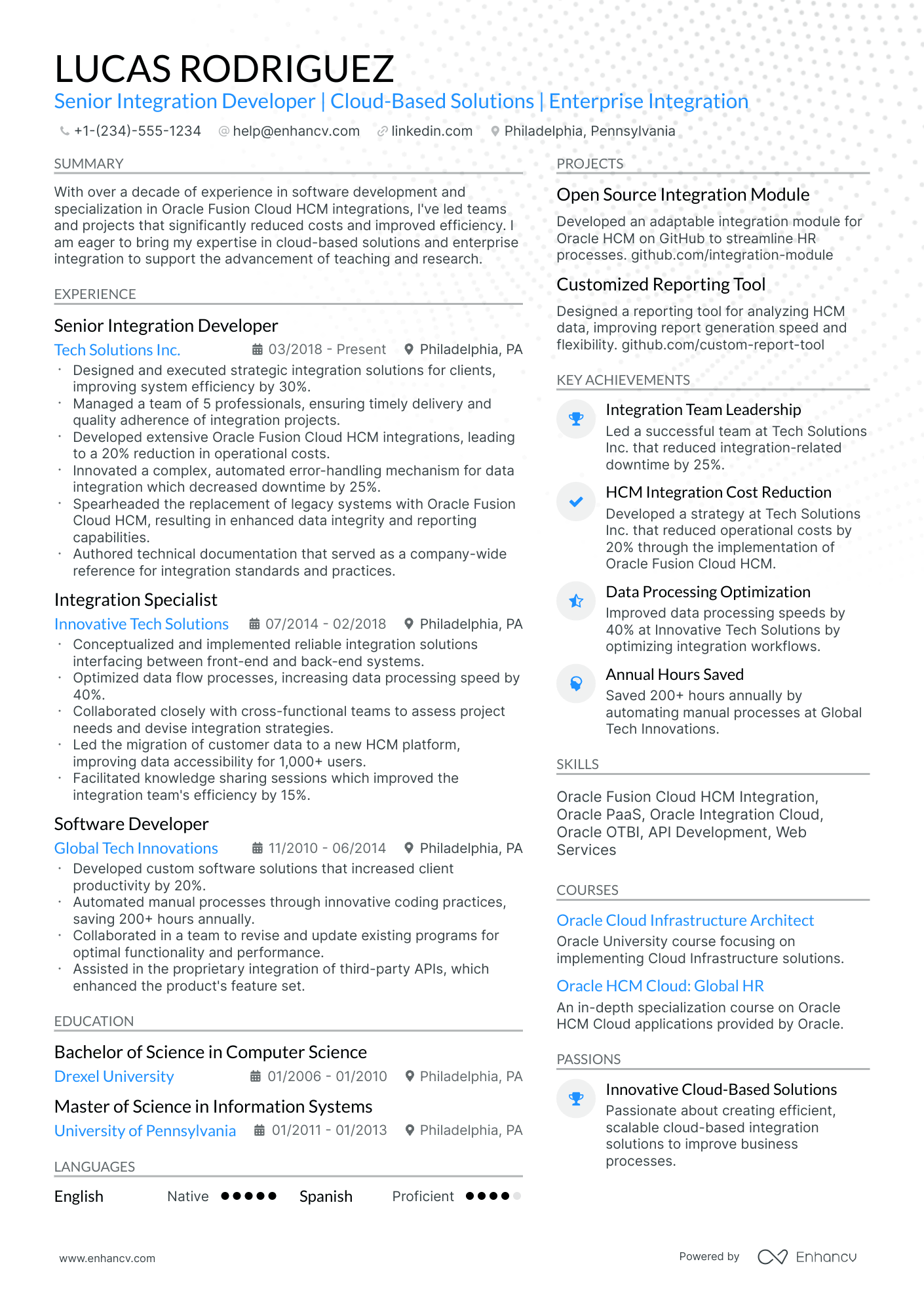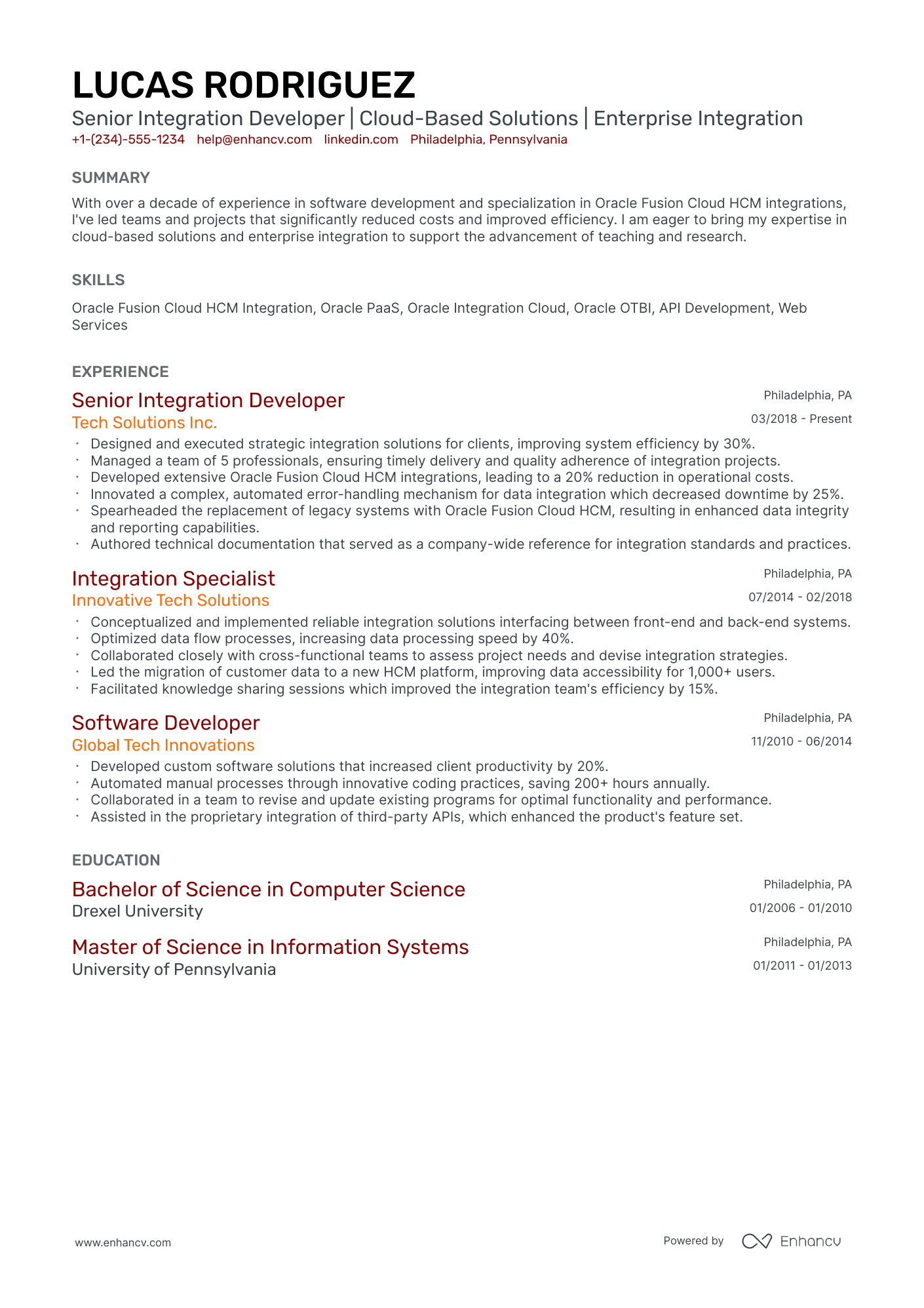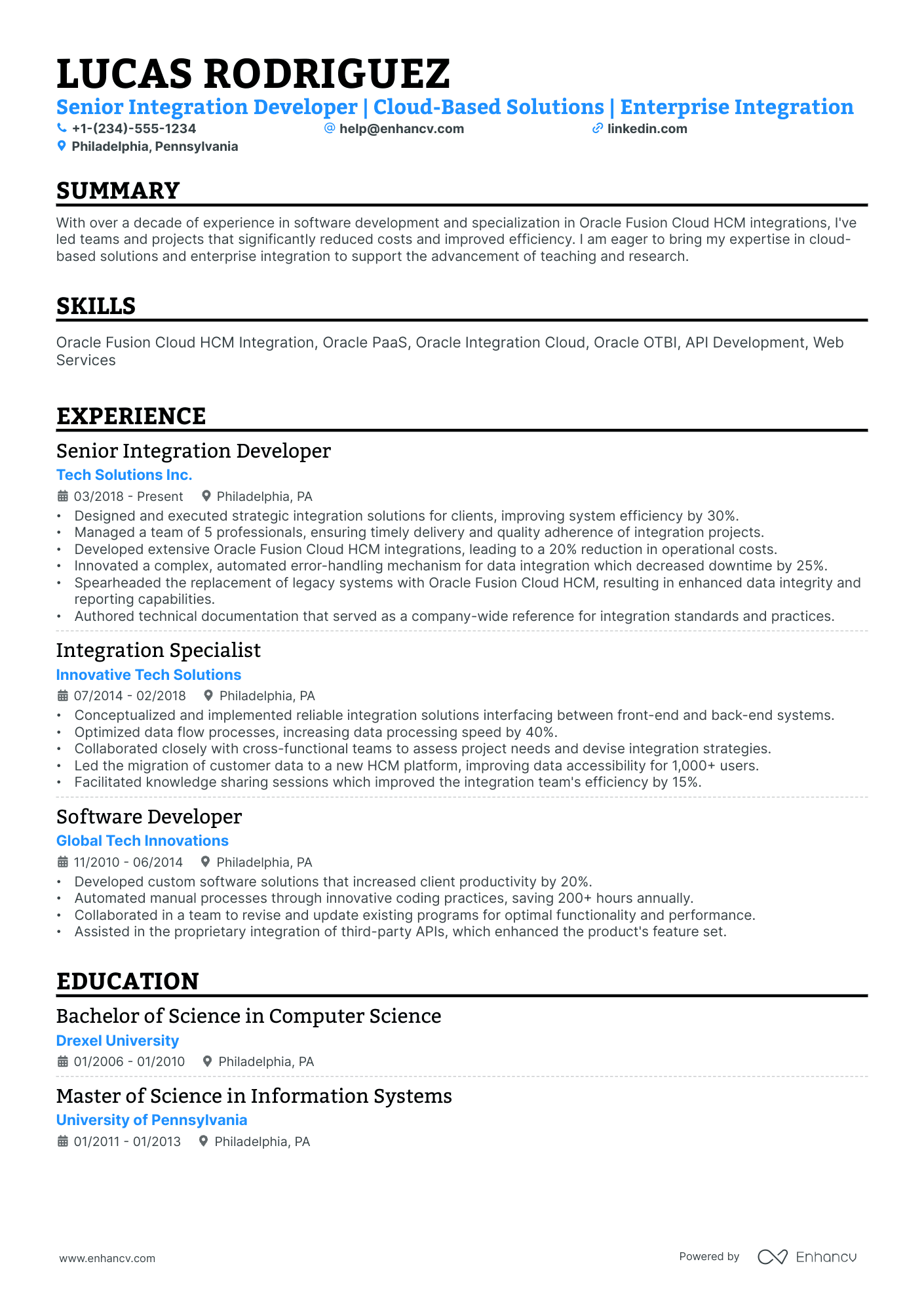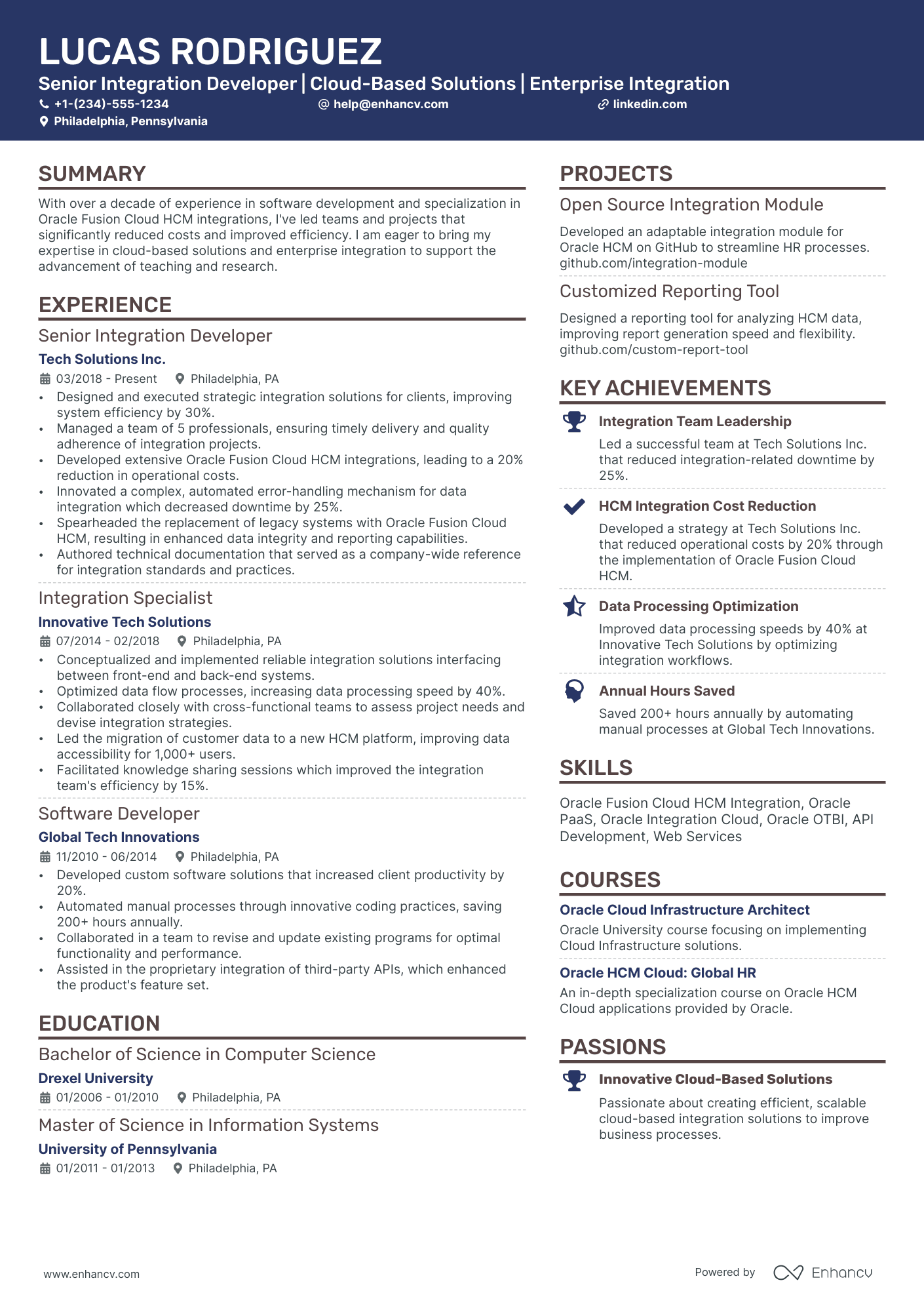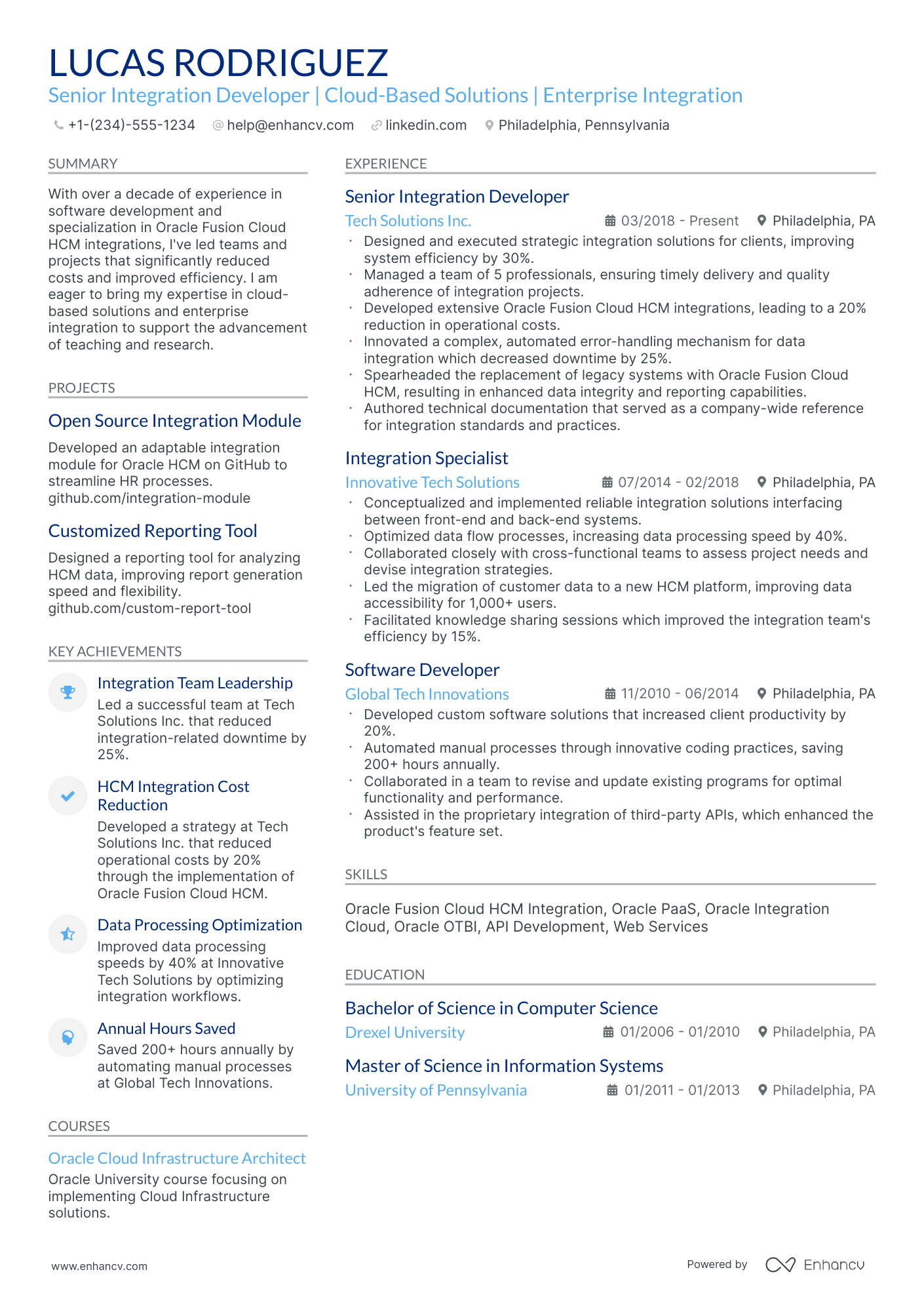As an integration developer, articulating the varied and complex systems you've linked can be a daunting resume challenge. Our guide offers clear strategies to showcase your technical prowess and project impact, ensuring your unique skills stand out to potential employers.
- Sample industry-leading examples to learn how to write your best resume yet.
- Improve the experience, education, and achievements section of your resume with insights from resume-writing professionals.
- Curate your technical expertise and personality to stand out amongst the pool of candidates.
- Succinctly focus on your unique skill set all through your integration developer resume.
If the integration developer resume isn't the right one for you, take a look at other related guides we have:
- Software Programmer Resume Example
- SAP Abap Developer Resume Example
- Software Test Engineer Resume Example
- Software Product Manager Resume Example
- Drupal Developer Resume Example
- Embedded Software Engineer Resume Example
- iOS Developer Resume Example
- Java Software Engineer Resume Example
- Junior Web Developer Resume Example
Optimize your integration developer resume format to pass the recruiters' assessment
You may be wondering just how much time you need to spend on designing your integration developer resume.
What recruiters are looking for is systematised content that is clear and coherent. Thus, your integration developer resume needs to answer requirements and why you're the best candidate for the role from the get-go.
Often, a clear layout consists of:
- Sorting your experience in the reverse chronological order - starting with your most recent and relevant roles. This is an excellent choice for more experienced professionals;
- Writing your contact information (e.g. personal phone number and email address) and your portfolio or LinkedIn link in your integration developer resume header. If you're wondering to include a photo or not, always make sure that it's appropriate for the country you're applying in;
- Use the basic, most important integration developer resume sections - your experience, education, summary, etc. Use your resume's real estate wisely to tell a compelling, professional story and match job description's keywords;
- Don't go overboard with the length of your resume. One page is absolutely fine if you happen to have under a decade of relevant experience.
Are you still wondering if you should submit your integration developer resume in PDF or Word format ? The PDF has a few more advantages, as it doesn't change the format and the text can't be altered upon application.
Format matters most when your integration developer resume is assessed by the Applicant Tracker System (or the ATS).
The ATS parses resumes, looking for specific keywords, skills or experience that match the job description.
P.S. We recently did a study on how the ATS works and were able to demystify three of the biggest misconceptions about how it assesses candidate resumes.
To pass the ATS evaluation, select any of the serif or sans-serif fonts. Popular choices that would help your integration developer resume stand out include Raleway, Exo 2, Montserrat, etc.
Most traditionalists go for Arial or Times New Roman, but it's often the case that many candidates choose these fonts, and you'd thus lose points on the uniqueness front.
Different markets have specific resume formats – a Canadian resume could vary in layout.
Upload & Check Your Resume
Drop your resume here or choose a file. PDF & DOCX only. Max 2MB file size.
PRO TIP
If you're in the process of obtaining your certificate or degree, list the expected date you're supposed to graduate or be certified.
Don't forget to include these six sections on your integration developer resume:
- Header and summary for your contact details and to highlight your alignment with the integration developer job you're applying for
- Experience section to get into specific technologies you're apt at using and personal skills to deliver successful results
- Skills section to further highlight how your profile matches the job requirements
- Education section to provide your academic background
- Achievements to mention any career highlights that may be impressive, or that you might have missed so far in other resume sections
What recruiters want to see on your resume:
- Experience with integration platforms and tools (e.g., MuleSoft, Dell Boomi, Apache Camel, IBM Integration Bus).
- Expertise in API design, development, and management, as well as understanding of RESTful services and SOAP.
- Proficiency in multiple programming languages relevant to integration, such as Java, Python, or JavaScript, and familiarity with microservices architecture.
- Knowledge of enterprise integration patterns and best practices, as well as experience with message queues (e.g., Kafka, RabbitMQ) and event-driven systems.
- Demonstrable experience with CI/CD pipelines, automated testing, and version control systems (e.g., Jenkins, Git), as well as containerization technologies like Docker and Kubernetes.
Quick formula for writing your integration developer resume experience section
Have you ever wondered why recruiters care about your integration developer expertise?
For starters, your past roles show that you've obtained the relevant on-the job training and expertise that'd be useful for the role.
What is more, the resume work experience section isn't just your work history , but:
- shows what you're capable of achieving based on your past success;
- proves your skills with (oftentimes, tangible) achievements;
- highlights the unique value of what it's like to work with you.
To ensure your resume work experience section is as effective as possible, follow this formula:
- start each bullet with a powerful, action verb , followed up by your responsibilities, and your workplace success.
The more details you can include - that are relevant to the job and linked with your skill set - the more likely you are to catch recruiters' attention.
Additionally, you can also scan the job advert for key requirements or buzzwords , which you can quantify across your experience section.
Not sure what we mean by this? Take inspiration from the integration developer resume experience sections below:
- Orchestrated the integration of a new CRM system with existing ERP infrastructure at Accenture, enhancing data accessibility and boosting sales team productivity by 20%.
- Led a cross-functional team in deploying a middleware solution that streamlined data communication between disparate systems, reducing system downtime by 30%.
- Developed comprehensive API strategies for third-party service integration, enabling secure data exchange and expanded functionality to client applications.
- Implemented an enterprise-wide service-oriented architecture at IBM, resulting in a 25% reduction in integration costs due to reusable services and standardized protocols.
- Automated data processing workflows, achieving a 15% increase in process efficiency and a significant reduction in human error.
- Pioneered the use of containerization for deployment of integration services, leading to a 50% improvement in deployment times and enhanced scalability.
- Initiated and delivered a cloud integration platform at Salesforce, which facilitated a 40% quicker market response for new features due to improved interconnectivity.
- Performed data migration and synchronization tasks for major clients, ensuring zero data loss and maintaining 99.9% system availability.
- Developed custom integration solutions utilizing RESTful APIs and Web Services, which allowed for seamless data exchange with external partners.
- Enabled datamart consolidation at Oracle through efficient ETL processes, which provided analysts with timely insights, improving decision-making speed by 35%.
- Architected an integration framework that reduced development time for new integrations by 45%, enhancing business agility.
- Collaborated with stakeholders to understand needs, which led to the design and implementation of a robust message queuing system, ensuring reliable message delivery.
- Spearheaded a key project at SAP to integrate third-party logistics services, improving supply chain efficiency by 25% due to more accurate tracking and forecasting.
- Optimized data integrity across platforms by establishing a comprehensive data validation and error-handling protocol, which minimized data discrepancies.
- Engineered and deployed real-time data integration solutions that supported high-volume transactions without impacting the performance.
- Designed a scalable integration platform at Google, accommodating a 50% increase in service demand while maintaining a 99.98% uptime.
- Determined business needs, translating to a 10% increase in customer satisfaction after implementing targeted API integrations for key services.
- Collaborated with the development team to enhance the CI/CD pipeline, which cut down release cycles by two weeks and increased deployment reliability.
- Facilitated a major upgrade of middleware components at Microsoft, leading to a 20% boost in message processing speeds and heightened security protocols.
- Identified and resolved systemic data bottlenecks, increasing system throughput by 30%, ensuring higher SLA compliance.
- Championed the adoption of API-led connectivity in several departments, fostering a more agile and responsive IT infrastructure.
- Developed integration processes for large-scale IoT deployments at Cisco, providing durable and scalable ways to handle device data ingestion and processing, yielding an uptick in big-data capabilities.
- Managed a distributed team of junior developers to build a resilient message queuing system that supported a 100% increase in message volume without additional resources.
- Instituted real-time analytics integrations, empowering business users with instant insights and fostering a data-driven culture.
Quantifying impact on your resume
- Detail the number of successful integrations you have implemented, demonstrating your direct contribution to project completions.
- Specify the percentage of improvement in data processing speed post-integration, highlighting efficiency gains.
- Quantify the cost savings achieved for previous projects through effective integration solutions.
- Include the number of integration platforms and technologies you are proficient with to establish breadth of expertise.
- Mention the scale of data you have managed (e.g., terabytes, petabytes), showing your ability to handle significant workloads.
- State the number of cross-functional teams you have collaborated with, illustrating your teamwork capabilities in diverse environments.
- Describe the reduction in downtimes or error rates you have accomplished through integration optimization.
- Quantify the number of training sessions or workshops you've conducted, evidencing your role in knowledge transfer and team skill enhancement.
Action verbs for your integration developer resume
Integration developer resume without experience: a walk-through guide
If you don't happen to have any relevant experience yet, you can substitute this with:
- Short-term gigs and stunts - like month-long internships, that you have done during your university days
- Contract work - be specific about the relevance and outcomes of each role you include
- Resume format that prioritizes your skills - the functional-skill-based format or hybrid format could work
- Research roles - feature those especially prominently if you've participated in a noteworthy project or your role was of utmost importance to the project's success.
Recommended reads:
PRO TIP
Bold the names of educational institutions and certifying bodies for emphasis.
Shining a light on your integration developer hard skills and soft skills
To win recruiters over, you must really have a breadth of skill set presented and supported within your integration developer resume.
On hiring managers' checklists, you'd initially discover hard or technical skills. Those are the technology (and software) that help you perform on the job. Hard skills are easy to quantify via your education, certificates, and on-the-job success.
Another main criterion recruiters are always assessing your integration developer resume on is soft skills. That is your ability to communicate, adapt, and grow in new environments. Soft skills are a bit harder to measure, as they are gained both thanks to your personal and professional experience.
Showcase you have the ideal skill set for the role by:
- Dedicating both a skills box (for your technical capabilities) and an achievements or strengths section (to detail your personal skills).
- When listing your skills, be specific about your hard skills (name the precise technology you're able to use) and soft skills (aim to always demonstrate what the outcomes were).
- Avoid listing overused cliches in the skills section (e.g. Microsoft Office and Communication), unless they're otherwise specified as prominent for the role.
- Select up to ten skills which should be defined via various sections in your resume skills sidebar (e.g. a technical skills box, industry expertise box with sliders, strengths section with bullets).
Spice up your resume with leading technical and people skills, that'd help you get noticed by recruiters.
Top skills for your integration developer resume:
Java
C#
SQL
RESTful APIs
SOAP
ETL Tools
Apache Camel
MuleSoft
Integration Middleware
Cloud Integration
Problem-solving
Communication
Teamwork
Adaptability
Attention to Detail
Time Management
Critical Thinking
Analytical Skills
Creativity
Collaboration
PRO TIP
The more trusted the organization you've attained your certificate (or degree) from, the more credible your skill set would be.
The importance of your certifications and education on your integration developer resume
Pay attention to the resume education section . It can offer clues about your skills and experiences that align with the job.
- List only tertiary education details, including the institution and dates.
- Mention your expected graduation date if you're currently studying.
- Exclude degrees unrelated to the job or field.
- Describe your education if it allows you to highlight your achievements further.
Your professional qualifications: certificates and education play a crucial role in your integration developer application. They showcase your dedication to gaining the best expertise and know-how in the field. Include any diplomas and certificates that are:
- Listed within the job requirements or could make your application stand out
- Niche to your industry and require plenty of effort to obtain
- Helping you prepare for professional growth with forward-facing know-how
- Relevant to the integration developer job - make sure to include the name of the certificate, institution you've obtained it at, and dates
Both your certificates and education section need to add further value to your application. That's why we've dedicated this next list just for you - check out some of the most popular integration developer certificates to include on your resume:
The top 5 certifications for your integration developer resume:
- Azure Developer Associate (AZ-204) - Microsoft
- AWS Certified Developer – Associate (DVA-C01) - Amazon Web Services
- Certified Integration Professional (CIP) - MuleSoft
- IBM Certified Solution Developer - Integration Bus V10.0
- Red Hat Certified Engineer (RHCE) - Red Hat
PRO TIP
Listing your relevant degrees or certificates on your integration developer resume is a win-win situation. Not only does it hint at your technical capabilities in the industry, but an array of soft skills, like perseverance, adaptability, and motivation.
Recommended reads:
Adding a summary or objective to your integration developer resume
One of the most crucial elements of your professional presentation is your resume's top one-third. This most often includes:
- Either a resume summary - your career highlights at a glance. Select the summary if you have plenty of relevant experience (and achievements), you'd like recruiters to remember about your application.
- Or, a resume objective - to showcase your determination for growth. The perfect choice for candidates with less experience, who are looking to grow their career in the field.
If you want to go above and beyond with your integration developer resume summary or resume objective, make sure to answer precisely why recruiters need to hire you. What is the additional value you'd provide to the company or organization? Now here are examples from real-life integration developer professionals, whose resumes have helped them land their dream jobs:
Resume summaries for a integration developer job
- With over 7 years of experience as an integration developer within the finance sector, proficient in SOA, API design, and ESB implementation, I possess a proven track record of developing and optimizing complex integration solutions that have streamlined processes and increased efficiency for global banking systems.
- Seasoned integration developer with 10 years in the healthcare industry, adept in HL7 standards and FHIR protocols. Instrumental in constructing a unified patient data platform that led to a 30% reduction in redundancies and improved data analysis capabilities for a network of hospitals across the Southeast region.
- Software Engineer pivoting to Integration Development bringing 5 years of experience in object-oriented programming and database management. Demonstrated quick learning curve with a recent certification in MuleSoft Anypoint Platform and a commitment to bridging disparate system architectures for enhanced operational coherence.
- Experienced Data Analyst making a transition to integration developer, offering a strong foundation in Python, machine learning, and data warehousing. Initiated an internal data integration tool that enhanced reporting accuracy by 25%, aspiring to leverage analytical rigour to solve complex integration challenges.
- Eager to apply my passion for technology and problem-solving as an integration developer, despite lacking industry experience. Committed to bringing my strong foundation in Java and SQL, alongside an unwavering dedication to mastering cutting-edge integration tools and methodologies through continued learning and hands-on experience.
- Recent Computer Science graduate prepared to channel an enthusiastic work ethic and foundational knowledge in cloud computing and APIs into a successful career as an integration developer, aiming to contribute to the creation of seamless data exchange solutions and to persistently grow within the field.
Optimize your resume summary and objective for ATS
Drop your resume here or choose a file.
PDF & DOCX only. Max 2MB file size.
Taking your integration developer resume to the next level with these four additional resume sections
Your integration developer resume can feature a variety of skills (both hard and soft) in diverse sections. Choose those that align best with the job requirements and reflect your suitability for the company culture.
Consider these four additional resume sections recommended by our experts:
- Languages - State any languages you are proficient in and your level of proficiency. This demonstrates your commitment to communication and potential for international growth.
- Projects - Highlight up to three significant projects you've completed outside of work, showcasing skill development. Include a link to your project portfolio in the integration developer resume header, if applicable.
- My Time - How you allocate your time outside work can indicate your organizational skills and cultural fit within the company.
- Volunteering - Detail causes you're passionate about, roles you've held, and achievements in volunteering. Such experiences likely have honed a range of soft skills crucial for your dream job.
Key takeaways
We've reached the end of our integration developer resume guide and hope this information has been useful. As a summary of our key points:
- Always assess the job advert for relevant requirements and integrate those buzzwords across various sections of your integration developer resume by presenting tangible metrics of success;
- Quantify your hard skills in your certificates and skills section, while your soft skills in your resume achievements section;
- Ensure you've added additional relevant experience items, such as extracurricular activities and projects you've participated in or led;
- Use both your resume experience and summary to focus on what matters the most to the role: including your technical, character, and cultural fit for the company.
